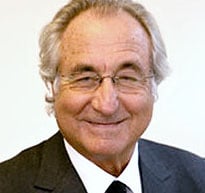It’s an established principle that recessions can expose frauds. By that standard, one of the costliest recessions of the last 50 years accomplished more than the usual—it exposed one of the biggest frauds in modern economic history. Read all about Bernard Madoff’s spectacular Ponzi scam of $12-20 billion below!!
Bernard Madoff founded a penny stock firm in 1960 with $5,000. Eventually, the firm pioneered some of the innovative computer technology that eventually became the NASDAQ. At one time, Madoff’s firm was the largest market maker in the NASDAQ. Madoff had such an established name in the financial industry, most people trusted him implicitly.

Bernard Madoff wins respect and begins a Ponzi scheme
Madoff also contributed large amounts of money to charitable organizations and politicians. He held major positions at Yeshiva University and managed a charitable organization. With his heavy involvement in cultural and philanthropic efforts, Madoff also won the respect of many well-known individuals—particularly fellow Jews. But at some point in the 1980’s, Madoff began a pattern of financial fraud. In 1991, Madoff began one of the largest and longest Ponzi schemes in the entire history of finance.
The Ponzi scheme explained
Ponzi schemes have existed as long as there have been financial resources to exploit. The concept is fundamentally simple. A financier offers a new fund and promises almost impossible returns on investment. As long as people contribute their money, there is no problem. Every quarter, the owner of the fund tells his investors that returns have been wildly successful again. This only encourages more people to entrust their money to the fund, and it continues to grow. Whenever an investor asks for his money back, the financier simply pays him from the people that recently joined. Because the rates are consistently much higher than the rest of the market, most people choose to leave their money in as long as possible. Everyone is happy: investors love seeing the great results on their account; new investors clamor to join; the owner of the fund enjoys a steady stream of new clients. But underneath it all, the scheme is only temporary. The simple fact is that the fund doesn’t actually contain enough money to meet what is owed. In other words, the fund isn’t growing nearly as quickly as claimed. As long as new people continue to join, the good times continue to roll, but this can only last so long.
The big lie
In Bernard Madoff’s case, everything came to an end in December, 2008. After the stock market disruptions in October, a large number of investors asked for their money back. When Madoff couldn’t produce, he was forced to admit that his entire investment fund, over a period of almost 20 years, had been “just one big lie.”
Madoff gets a prison sentence of 150 years without parole
At the age of 70, with a claimed personal and business value of more than $850 million, Madoff’s assets were seized and he was placed under arrest. In 2009, Madoff received a lifetime ban from the securities industry, and a prison sentence of 150 years without parole. His projected release date is November 14, 2139.
Many made huge losses
But Madoff was hardly the one that suffered from his scheme. The total loss to investors will never be known, but it is estimated to be between $12 and $20 billion. His actions destroyed the fortunes of many individuals, as well as several large organizations, including Yeshiva University, the Women’s Zionist Organization of America, and Steven Spielberg’s Wunderkinder Foundation. One organization, the Lappin Foundation, was forced to temporarily close because its entire endowment of $8 million was invested with Madoff. Other organizations shut down entirely.

One of the best known clients that lost because of Madoff was Elie Wiesel—the holocaust survivor, writer, and Nobel Laureate. Wiesel confessed that he had lost his entire life savings to the scheme, and the Elie Wiesel Foundation for Humanity stated that nearly all of its assets ($15.2 million) were also lost. Wiesel first met Madoff when a wealthy friend introduced them and recommended the fund. “We thought he was God; we trusted everything in his hands,” Wiesel confessed. “Could I forgive Him? No. To forgive, first of all, would mean that he would come on his knees and ask for forgiveness. He wouldn’t do that.”
How could this happen?
How was it possible for Bernard Madoff to get away with this fraud for so long, at such a huge loss for so many people? Unfortunately, this wasn’t the first time that someone questioned the legitimacy of the fund. Harry Marcopolos looked at the fundamentals for Madoff’s fund in 1999 and felt like it too good to be true. He repeatedly contacted the SEC and warned them that Madoff’s results were mathematically and financially impossible. But for whatever reason, the regulatory systems that were designed to present frauds like this completely failed.
The lesson for you as a Forex trader
What is the lesson for forex traders? There are several things that could be said. The first lesson is fairly basic—if it sounds too good to be true, it probably is. This is easy enough to see with investment funds, but the same can happen in the forex market. Since the advent of online trading, there have been many instances of “brokerages” or forex opportunities that were little nothing more than scams. Whether a brokerage, some type of forex opportunity, or even a robot, look at the promised returns to see if they are realistic.
A second lesson also emerged from the Madoff fiasco: regulatory agencies are never an absolute guarantee. Just because a brokerage or investment fund falls under the SEC is no assurance that your money will be safe or even that the investment is legitimate at all. Remember that being under a regulatory agency is a far cry from FDIC insurance. In 2003, Madoff thought he was finished when the SEC investigated his fund. Instead, he was shocked that they didn’t even ask to look at his records. If the agencies that were supposed to regulate funds like Madoff’s failed once, they can and will fail again.
Simply put, no investor in any sector is ever free from the responsibility to exercise simple, common sense. Be careful. Use your head. Don’t get greedy, or you could end up losing an awful lot of money.
Read about other highly interesting scams below.
Corruption on Wall Street, Fabrice Tourre, the brain behind the $1 billion Goldman Sachs scam.
Is fiat currencies the biggest Forex Fraud ever?
Joel Nathan Ward stole $11.3 million from more than 100 investors.
Read about the Cyber Market Group potential Ponzi scam.
Related Articles
- Forex vs Crypto: What’s Better For Beginner Traders?
- Three Great Technical Analysis Tools for Forex Trading
- What Does Binance Being Kicked Out of Belgium Mean for Crypto Prices?
- Crypto Traders and Coin Prices Face New Challenge as Binance Gives up its FCA Licence
- Interpol Declares Investment Scams “Serious and Imminent Threat”
- Annual UK Fraud Audit Reveals Scam Hot-Spots
Forex vs Crypto: What’s Better For Beginner Traders?
Three Great Technical Analysis Tools for Forex Trading
Safest Forex Brokers 2025
| Broker | Info | Best In | Customer Satisfaction Score | ||
|---|---|---|---|---|---|
| #1 |
|
Global Forex Broker |

BEST SPREADS
Visit broker
|
||
| #2 |
|
Globally regulated broker |

BEST CUSTOMER SUPPORT
Visit broker
|
||
| #3 |
|
Global CFD Provider |

Best Trading App
Visit broker
|
||
| #4 |
|
Global Forex Broker |

Low minimum deposit
Visit broker
|
||
| #5 |
|
Global Forex Broker |

Low minimum deposit
Visit broker
|
||
| #6 |
|
CFD and Cryptocurrency Broker |

CFD and Cryptocurrency
Visit broker
|
||
|
|
|||||
Forex Fraud Certified Brokers
Stay up to date with the latest Forex scam alerts
Sign up to receive our up-to-date broker reviews, new fraud warnings and special offers direct to your inbox


